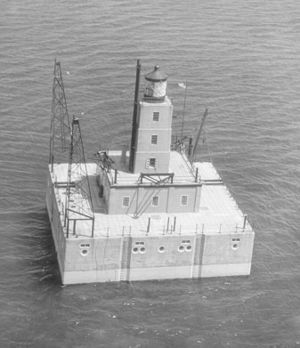Lansing Shoals Light Station facts for kids
 |
|
|
|
|
| Location | NE Lake Michigan, 6.3 miles (10.1 km) SE of Point Patterson |
|---|---|
| Coordinates | 45°54′12″N 85°33′42″W / 45.90333°N 85.56167°W |
| Year first lit | 1928 |
| Automated | 1976 |
| Deactivated | N/A |
| Foundation | concrete and steel crib |
| Construction | reinforced concrete and steel |
| Tower shape | square |
| Markings / pattern | natural |
| Height | 59 feet (18 m) |
| Focal height | 69 feet (21 m) |
| Original lens | third order Fresnel lens |
| Current lens | 7.5-inch (190 mm) acrylic optic |
| Range | 14 nautical miles; 26 kilometres (16 mi) |
| Characteristic | FI W 10s |
| ARLHS number | USA-428 |
| USCG number | 7-21535 |
The Lansing Shoals Light Station is a lighthouse located in the northeastern part of Lake Michigan. It sits about 6.3 miles (10.1 km) southeast of Point Patterson, in Newton Township, Mackinac County, Michigan. This important structure was added to the National Register of Historic Places in 2005.
Contents
History: Lightships Guiding Ships
The Lansing Shoals are a tricky area for ships to pass through. They are at the northern end of a narrow shipping lane in Lake Michigan, near the Straits of Mackinac. In the 1890s, many ships carried iron ore from Escanaba, Michigan. This made it very important to have better lights in the area.
Early Lightships (LV55, LV56, LV57)
To help guide ships, the Lighthouse Board moved a special ship called LV55 to Lansing Shoals in mid-1900. LV55 was a "lightship," which is like a floating lighthouse. It was one of three similar ships approved by the United States Congress in 1889. These ships were meant to be placed at different tricky spots in the Great Lakes.
The three lightships, named LV55, LV56, and LV57, were built by the Blythe Craig Shipbuilding Company in Toledo, Ohio. They started working in late 1891.
Temporary Solutions and Challenges
Moving LV55 to Lansing Shoals was only a temporary fix. In 1908, the Lighthouse Board asked for money to build a permanent structure there. However, their request was not approved. So, LV55 stayed at the station until 1920. By then, its hull (the main body of the ship) was too damaged to fix, and it was taken out of service.
Another lightship, LV98, took its place. LV98 was built in 1914 by the Racine-Truscott-Shell Lake Boat Company in Muskegon, Michigan. But there was a problem: Great Lakes ships started sailing later into the winter and earlier in the spring. During these times, ice would build up, making it impossible for the lightship to stay in place. This made it clear that a permanent lighthouse was needed.
History: Building the Light Station
In 1926, Congress finally approved the money to build a permanent light station. Workers found a good spot, and construction on the foundation began in 1927. The Lansing Shoals Light Station was lit for the first time on October 6, 1928. After that, lightship LV98 was no longer needed.
Automation and Modern Use
The light station had a crew living there until the summer of 1976. At that time, the original Fresnel lens was replaced with a newer, acrylic optic. The station then became automated, meaning no one needed to live there anymore.
The original Fresnel lens is now on display at the Michigan State Historical Museum in Lansing, Michigan. Today, the Lansing Shoals Light is still used to help ships navigate safely.
Design and Structure
The Lansing Shoals Light Station is built on a base of stone. Its foundation is made of concrete caissons, which are like large, watertight boxes. The main part of the structure, called the crib, is made of strong, reinforced concrete.
Inside the Base
Inside the crib is a basement that is 69 feet (21 meters) on each side. This basement is split into two areas: one for machinery and another for the crew's sleeping rooms. The basement originally had 27 round windows, called portholes, each 24 inches (61 cm) wide. However, all the windows in the structure were sealed up after the light became automated.
Main Deck and Tower
The ceiling of the basement forms the main deck of the light station. This deck is about 20 feet (6.1 meters) above the lake's surface. In the middle of the deck sits a square house, 37 feet (11 meters) wide and 12 feet 8 inches (3.86 meters) tall. This house used to hold the kitchen, dining room, and other living areas for the crew.
In the center of this house is a three-story square tower. The tower gets narrower as it goes up, from 13 feet (4.0 meters) at its base to 11 feet (3.4 meters) at the top. Both the house and the tower are built from concrete covered with a protective layer. On top of the tower is a round, cast-iron lantern room. This room originally held a third-order Fresnel lens with a 500-watt light bulb.


